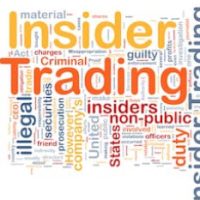Facing Insider Trading Charges?

You know you are good at your job when portrayals of it in the entertainment media annoy you. Real doctors, lawyers, real estate agents, and teachers are nothing like how Hollywood screenwriters portray them. You know what your Hollywood-created on screen avatar should do in the situation portrayed on screen. And you can think of myriad ways that he or she could have easily avoided getting into such a situation in the first place. If screenwriters only bothered to take advice from real professionals, TV might be less entertaining, but at least it could begin to live down its reputation as an idiot box, a reputation that persists even though TV screens have been flat for decades. Likewise, if stock market investments were made by people with firsthand knowledge of what publicly traded companies are doing or planning to do, the stock market would be less entertaining but more lucrative. Naturally, most people who make stock market investments based on solid evidence instead of on pure speculation run the risk of facing criminal penalties. Here, our Miami white collar crime lawyer explains the crime of insider trading and the ways in which corporate insiders can invest in the stock market without breaking the law.
What Is So Bad About Using Your Professional Knowledge?
One might argue that justice and capitalism naturally repel each other, but the stock exchange operates on the assumption that it is only fair to offer the public the opportunity to buy shares of stock in publicly traded companies if all potential investors have access to the same information about the companies’ activities and performance. Therefore, insider trading is a crime. Insider trading is when you find out important information about a company’s recent gains or losses or its plans for the near future, and you use this information to guide your decision to buy or sell shares of stock before the company releases this information in published reports. In other words, you make your trades based on inside information, which the law considers cheating; in other words, you are taking advantage of other investors’ lack of access to the information.
Charges of insider trading can apply regardless of how you found out the inside information. You might have found it out because you work for the company, or you could have learned it from a friend or family member who works there. You might have even found it out through corporate espionage. What matters is that you knew it before the company revealed it to the public.
When Is Insider Trading Legal?
Not all stock market trades by insiders or people with inside information meet the definition of insider trading as indicated in the criminal code. The law categorizes you as an insider to a company if you own more than ten percent of that company, but you should assume that the court will consider you an insider if your work brings you into contact about your company’s activities and performance that it has not yet revealed to the investing public. If you are party to inside knowledge about your employer, and you plan to make trades on the stock market where the inside information is relevant, you should file disclosures with the Securities and Exchange Commission. When insiders are transparent about what they know, it is not considered cheating.
Defenses to Accusations of Insider Trading
Like many other crimes, charges of insider trading cannot result in a conviction unless the prosecution can prove that you acted with criminal intent. In other words, proving that you bought or sold X number of shares of stock in a certain company on a certain date is easy to prove. What is less easy to prove is why you did it. Remember, the burden of proof is on the prosecution to prove what you knew and when you found it out. It is not easy for the prosecution to do this unless it shows the jury emails or text messages from before the time of the trade, in which you refer to the inside information. It could also summon witnesses who claim to have heard you talking about the inside information to claim to have told it to you, but you have the opportunity to cross examine them and find ambiguities or inconsistencies in their testimony. Another possible defense is that you knew the inside information before you made the trade, but you filed the required disclosures.
Contact Our Criminal Defense Attorneys
A South Florida criminal defense lawyer can help you if you are facing criminal charges for insider trading. Contact Ratzan & Faccidomo in Miami, Florida for a confidential consultation about your case.
Source:
news.fiu.edu/2023/insider-trading-the-legal-kind-is-a-lot-more-profitable-if-you-work-for-a-multinational-company


